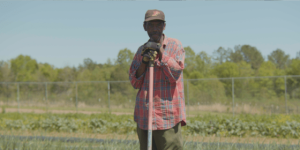The USDA recently selected Michigan as one of eight states to participate in a pilot program that will help school districts increase purchases of locally-grown fruits and vegetables for school meal programs. Additionally, two Michigan school districts – including Detroit Public Schools – received funding from the USDA’s Farm to School grants to match school cafeterias with local farmers and ranchers.
“Michigan is a leader in connecting schools with local farmers and with local, healthy food,” said Carla D. Thompson, vice president of program strategy, with the W.K. Kellogg Foundation. “The USDA grants will ensure that more children – in Michigan and across the nation – have the opportunity to thrive in school and life.”
The Kellogg Foundation supports farm to school efforts in Michigan and throughout the country, to ensure children enjoy healthy, locally-sourced meals. Many schools also provide educational programming. Through school gardens, farm field trips and cooking lessons, children establish an enduring relationship with good food.
“Good food – food that is healthy, sustainable, fair and affordable – is a contributor of academic success for children,” said Thompson. “For many children, food served at school may be the only food they regularly eat. Farm to school programs not only help kids do well in school, they help children build healthy habits that last a lifetime.”
According to a survey from the Michigan State University Center for Regional Food Systems (a WKKF grantee), the number of Michigan school food service directors participating in farm to school initiatives nearly tripled between 2004 and 2009.
Meanwhile, the Michigan Good Food Charter, developed in 2010 with broad input from people across the state, includes a goal for Michigan institutions – such as schools, early child care and education centers, hospitals, colleges and universities – to source 20 percent of their food from Michigan growers, producers and processors by 2020.
Learn more about WKKF’s work on farm to school initiatives.



